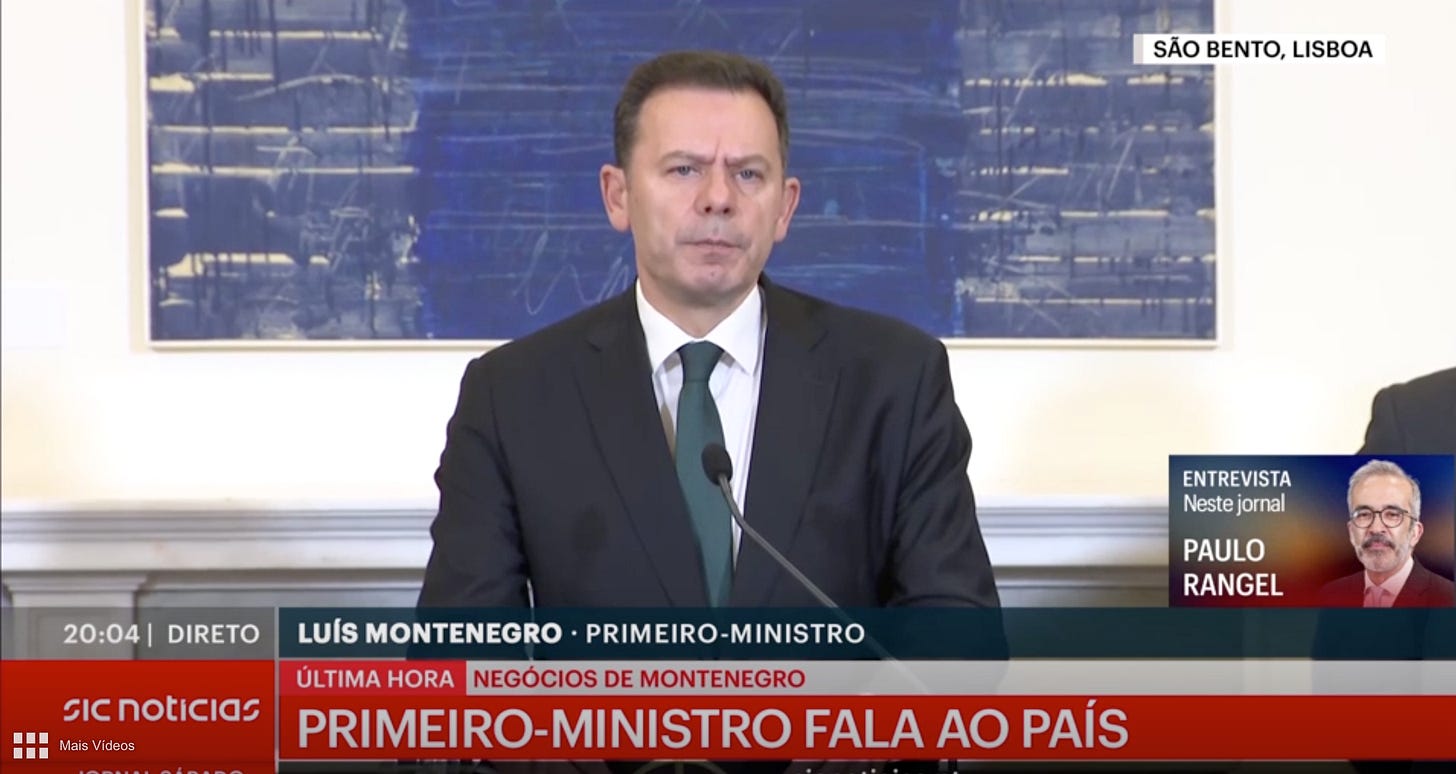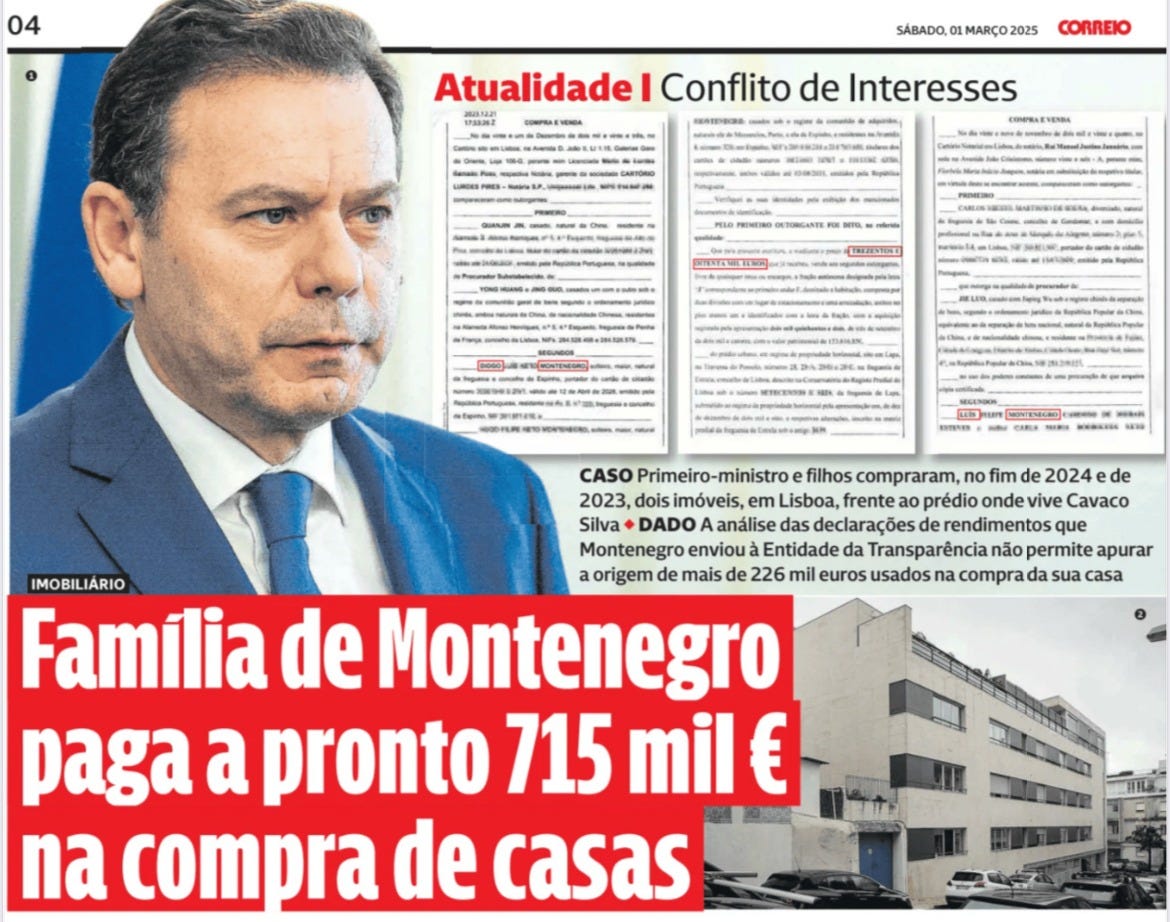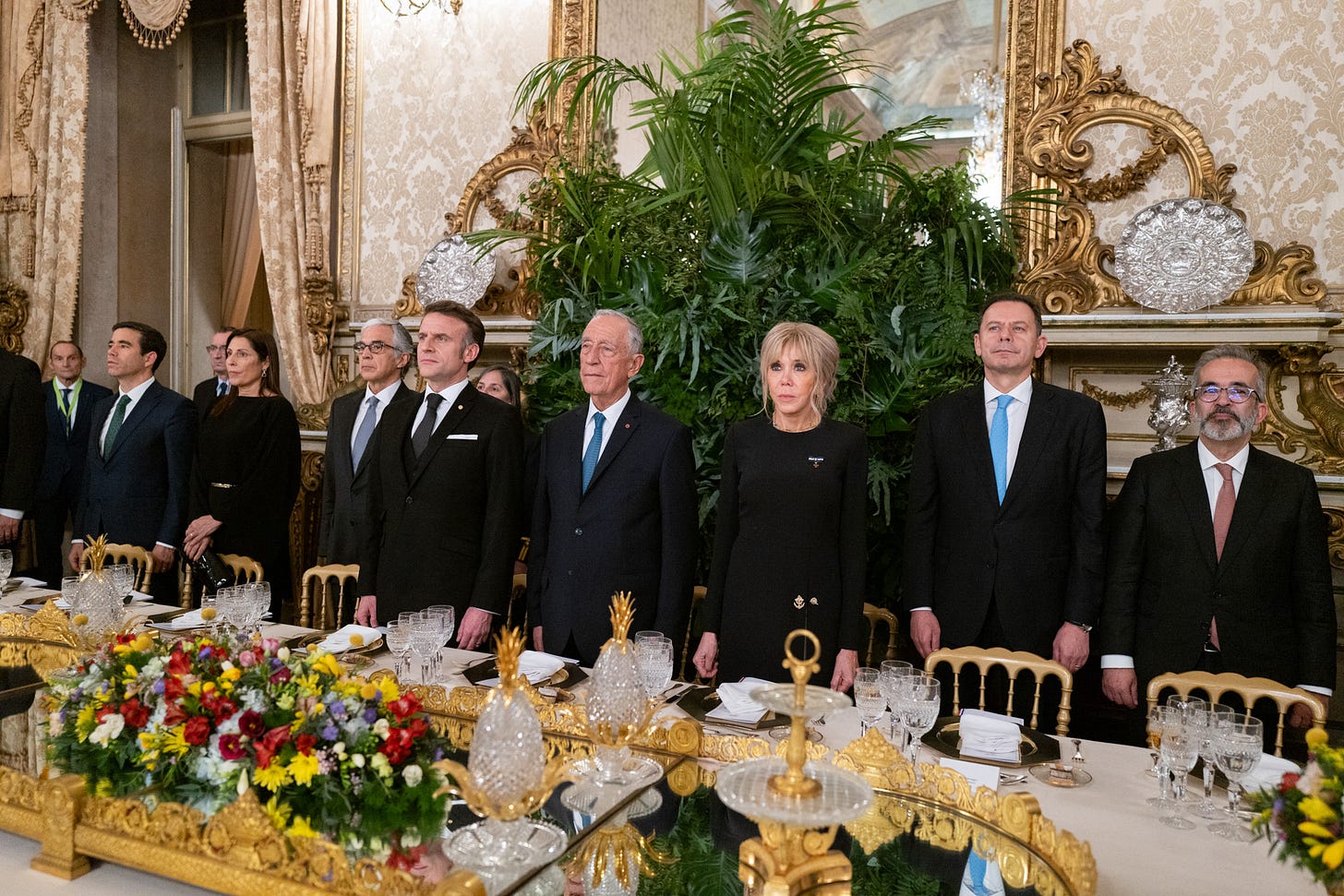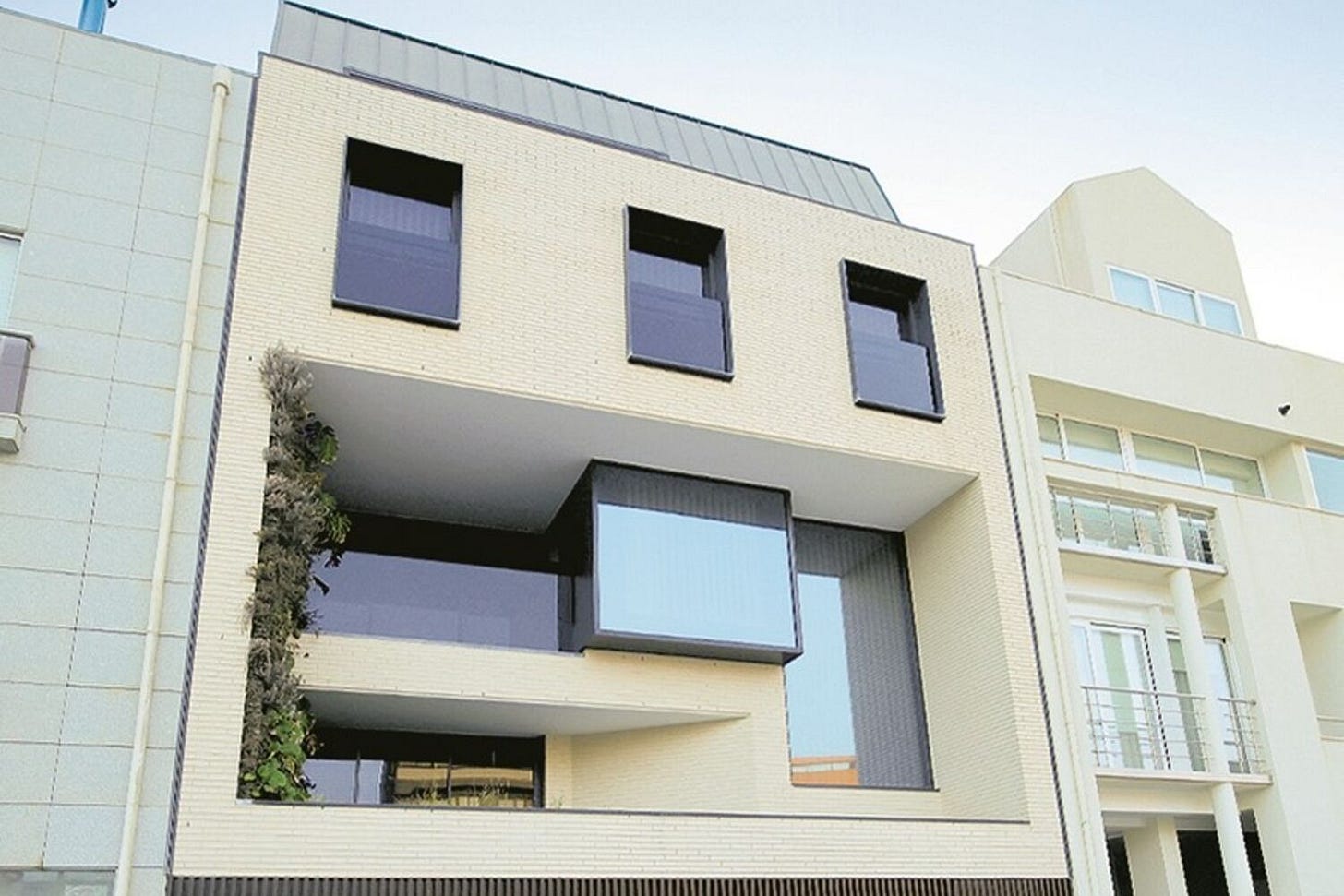Special Briefing: The PM's address to the nation
Last night, PM Montenegro addressed the nation over allegations of a conflict of interest involving his family's business. Here’s your essential guide to the scandal shacking Portuguese politics.
IN A NUTSHELL

Hey there! If you enjoy reading PORTUGAL DECODED, please consider donating to keep it free and independent – your generosity means everything!
Last Thursday, just as we were finalizing our Friday Briefing, reports surfaced that Solverde - a company managing casinos and hotels in Portugal - continues to pay €4,500 per month to Spinumviva, a company owned by PM Luís Montenegro’s family. While the potential political fallout was immediately clear, details were still scarce, and time was too short to fully adapt our weekly newsletter.
This Special Briefing is our way of making up for that - bringing you up to speed on a scandal that could push Portugal into a full-blown political crisis.
What Happened?
At 8 PM last night, from his official residence, PM Montenegro addressed the nation, flanked by his ministers, in an attempt to contain the growing scandal over his family’s business dealings. The full video of the address is available below (in Portuguese, with the option to enable automatic English subtitles).
He refused to resign but pledged not to be involved in decisions affecting companies with business ties to his family - implicitly acknowledging a conflict of interest that is difficult to reconcile with his position as Prime Minister.
He also announced that Spinumviva will now be owned by his children and will no longer be headquartered in his family home in Espinho. Aside from that, it will be business as usual.
Montenegro left key questions unanswered, including why multiple companies continue to pay Spinumviva monthly fees totaling up to €15,000, for what services, and by whom – which could potentially imply that he has earned money from a private activity while serving as Prime Minister of Portugal.
He also did not take questions from journalists, a standard practice for this Government, and admitted no wrongdoing.
Finally, he threatened to present a confidence motion if other parties questioned his ability to continue as PM.
The Political Fallout
All opposition parties in Parliament, except the Liberals (IL), said immediately that they would vote against the Government’s confidence vote, which would then trigger a snap election. However, the Communist Party (PCP) also announced a motion of no confidence against the Government, which the Socialists (PS) said they would vote against to prevent the Government from playing the victim - effectively, ensuring its rejection.
Later on TV, the Finance Minister declared that if the PCP’s motion fails due to the PS’s stance (which it will), the Government will interpret it a sign of political stability, not present the motion of confidence and remain in office.
For now, this appears to stave off a crisis, but watch out for the President’s response in the coming days—he has the power to dissolve Parliament and call new elections. At the same time, the PCP could still withdraw its no-confidence motion, keeping the uncertainty alive.
BACKGROUND Q&A
How did the scandal begin?
Exactly two weeks today, Correio da Manhã broke the story that PM Luís Montenegro’s wife and two sons own a consulting company, Spinumviva (we covered it here and here). Established in January 2021 by Luís Montenegro and his wife Carla Montenegro (a social worker), the company’s corporate purpose includes “business and management consulting activities” as well as “the trade and management of real estate, both owned and third-party, including acquisition for resale, leasing, and other forms of economic exploitation,” among others. In its first 3 years of operation, it generated €718,000 in revenue and accumulated €342,000 in profits.

Does PM Montenegro still own the company?
It is a subject of debate among legal experts. PM Montenegro says that on June 30, 2022, just over a month after being elected president of the PSD, he resigned from the management of the company. He transferred 92% of his stake (€3,450) to his wife, while the remaining 8% (€400) was equally distributed between his two sons, Hugo and Diogo. With this transaction, his wife came to hold 92% of the company's capital, while the sons each held 4%. However, most experts argue that the transfer of shares to his wife may be considered invalid, as the Prime Minister is married under a community property regime. Therefore, PM Montenegro remains a de facto shareholder of Spinumviva.
What did he say during the no-confidence vote last week?
During the no-confidence debate triggered by far-right Chega, PM Montenegro dismissed any conflict of interest, launching into a lengthy defense of his efforts to protect his family inheritance and pass on real estate to the next generation. He also detailed his household income over the past 15 years, declaring: “Throughout my life, I have declared everything that needed to be declared. I have paid everything that needed to be paid. I have clarified everything that needed to be clarified.” However, the document he presented only listed total annual income figures, without specifying their sources. He refused to disclose the names of his company’s clients, citing “professional confidentiality”, and did not clarify whether he had provided legal consulting services. Montenegro confirmed that his company had worked with the media group that owns Correio da Manhã and later admitted a relationship with the Solverde hotel and casino group, headquartered in Espinho—his hometown.
So, why did the no-confidence vote fail?
Socialist Party leader Pedro Nuno Santos dismissed Chega’s motion as a mere distraction from the series of scandals affecting the party, confirming that the PS would vote against it. Without the Socialists’ support - who hold 78 seats in Parliament - the motion lacked the necessary votes to pass. However, at the close of the debate, Socialist parliamentary leader and Lisbon mayoral candidate Alexandra Leitão criticized Prime Minister Luís Montenegro for sharing “irrelevant details” of his private life in a superficial attempt at “transparency”: “Transparency means stating what is relevant, not what is irrelevant.” She then posed three specific legal questions that she accused the PM of failing to address:
Had the declarative obligations been met, requiring the disclosure of public and private entities that received services?
Could the PM confirm compliance with tax obligations under the fiscal transparency regime for professional law firms, given indications that legal consultancy work had been conducted?
Could the PM clarify the conditions under which legal consultancy services were provided, considering that, under the legal framework at the time, such services could only be offered by law firms?
Montenegro did not respond to any of these questions and has since avoided further comment, seemingly hoping the issue would fade from public attention.
Why did the scandal explode this week?
On Friday, weekly newspaper Expresso revealed that Solverde - a Espinho-based company managing casinos and hotels in Portugal – continues to pay a monthly fee of 4,500€ to Spinumviva for services related to data protection and compliance through third parties. The PM worked for Solverde between 2018 and 2022 and represented the group in negotiations with the state, which resulted in the extension of the casino concession contracts for Espinho and the Algarve. The casino concession contract is set to expire at the end of the year, and the Government will have to decide on the matter.
How did PM react to the latest revelations?
He denied allegations of a conflict of interest between his role and a consulting firm he founded, announcing the cabinet would hold an extraordinary meeting to assess the matter. Speaking to reporters, Montenegro said that after Saturday’s cabinet session he would deliver a public address to “make an evaluation of all the personal and political context”. He refused again to release the identity of Spinumviva’s clients, and instead urged clients to come forward and identify themselves. The PM insisted that he stepped away from the company to dedicate himself to the presidency of the PSD (Social Democratic Party) in 2022, but he assured: “I will not give up my personal life to be Prime Minister.”
What do we know about Spinumviva’s clients?
On Friday afternoon, after refusing to reveal the identity of its clients, the Prime Minister’s family finally released a statement from Spinumviva disclosing a list of companies with which they “maintain a permanent relationship,” with monthly fees ranging between 1,000 and 4,500 euros. This means the company currently accumulates at least 9,000 euros in monthly fees. It remains unclear whether there are undisclosed clients who contract other services, as the company’s scope of activity covers additional areas. The clients on the list include:
Lopes Barata, Consultoria e Gestão, Lda: A company that, according to information consulted by ECO on the InformaDB platform, is currently inactive and previously operated under the name JCB – Produtos Farmacêuticos, Lda.
CLIP – Colégio Luso Internacional do Porto, SA: A private school offering pre-school, primary, and secondary education, located in Porto.
Ferpinta, SA: A group that claims to be “the largest Iberian manufacturer of steel tubes,” operating in the metalworking industry, founded in 1972 by the Portuguese millionaire and commendador Fernando Pinho Teixeira.
Solverde, SA: A company that operates casinos in Portugal, including online, owned by the Violas family, with whom Montenegro is “personally friends with the shareholders,” as he himself admitted during the censure motion debate.
Radio Popular, SA: A well-known chain of stores selling small and large household appliances, mobile phones, computers, and similar products. However, Spinumviva’s services are limited to “the implementation and development of action plans under the General Data Protection Regulation.”
From a political perspective, the list makes the dependent relationship between the company and its founder, the current Prime Minister, more evident. In the statement, Spinumviva clarifies that all these clients were acquired by Luís Montenegro when he was outside of politics, and the five disclosed companies all have a connection to Montenegro, including his past involvement in their corporate bodies.
What about the company’s workers?
During the parliamentary debate, socialist Alexandra Leitão questioned the PM about who carried out the data protection consultancy work for which Spinumviva was paid by the Solverde casino. Under the legal framework at the time, such services could only be offered by law firms. Given that among his family members, only PM Luís Montenegro held the necessary qualifications, there are only two possibilities: either he performed this work after becoming PM, which is highly unlikely, or he outsourced the services to third parties and paid only a small fraction of the remuneration, which is also politically damaging for him. The available information, revealed by Expresso, supports the latter hypothesis.
In the latest available financial report for 2023, when Montenegro was no longer a managing partner, the company billed 235,000 euros and paid 66,000 euros to external service providers. The report details this expenditure, specifying 5,000 euros for specialized work, likely to an accounting firm, and 26,000 euros in fees to external collaborators, commonly known as recibos verdes (freelancers). This means that for every nine euros charged to its clients, Spinumviva spent just one euro on specialized consultants for the services provided—only 11% of the fee went to those who actually performed the work.
Were then new revelations since then?
Yes. On Saturday, Correio da Manhã revealed that Luís Montenegro’s family purchased two apartments in Lisbon without taking out bank loans. Both apartments, one-bedroom units, are located in the Estrela district, directly across from the building where former President Aníbal Cavaco Silva resides. The first was bought in December 2023 by the PM’s children for over €300,000. In November 2024, Montenegro and his wife acquired a second apartment in the same building for €400,000. In response to the newspaper, the PM stated that the funds came from the family’s financial assets, dismissing any suspicions about the source of the money. Correio da Manhã also notes that Montenegro holds a €200,000 loan from Millennium BCP, despite having declared only €100,000 to the Transparency Entity, with no clear indication of where the remaining amount was allocated.

What does Portuguese law say about conflict of interest?
Law No. 52/2019, of July 31, establishes the “rules for the exercise of duties by holders of political and high public office,” such as public managers and members of the administration of publicly owned joint-stock companies. According to Article 4, paragraph 1, “holders of political office must perform their duties under an exclusivity regime.” The law goes even further: this exclusivity “is incompatible with any other professional activities, whether paid or unpaid,” as well as “membership in governing bodies of any for-profit legal entities.” However, there are exceptions.
The law allows: (a) Functions or activities derived from the position or exercised by necessity of office; (b) Membership in advisory or supervisory bodies of public entities; (c) Teaching and research activities in higher education, as provided by the statutes of each position and the statutes of higher education teaching careers; (d) Artistic and literary creation, as well as any other activities that generate income from copyright or intellectual property rights; (e) Participation in conferences, lectures, short-term training sessions, and similar activities; (f) Cases where the law explicitly allows the compatibility of duties.
However, the law excludes members of the Government from certain exceptions, such as (b) Membership in advisory or supervisory bodies of public entities; (c) Teaching and research in higher education; (e) Conferences, lectures, training sessions, and similar activities. According to Article 11, for elected officials (except the President of the Republic), violating these rules results in “loss of office.”
What are the motions of no-confidence and confidence?
The motion of no-confidence, which is a typical oversight tool in systems where the Government is accountable to Parliament, aims to disapprove the implementation of the Government’s Program or the handling of a matter of significant national interest. It can be submitted by one-quarter of the sitting Members of Parliament or by any parliamentary group. Its approval requires an absolute majority of the sitting Members of Parliament (a number of votes exceeding half of the sitting Members of Parliament) and results in the resignation of the Government;
The motion of confidence, which seeks to approve a vote of confidence on a declaration of general policy or a matter of significant national interest. It is presented by the Government, and its simple rejection leads to the resignation of the Government.
What do legal experts say about the matter?
Speaking to radio Renascença, constitutional law expert Jorge Reis Novais stated that if there had been an ongoing contract with the Solverde group since July 2021, it would be illegal: "The Prime Minister must be in an exclusivity regime, and that was not the case. He was receiving payments over several months.” Novais argues that, from a legal and constitutional perspective, Luís Montenegro has no option but to resign. If he does not, it should be up to the President of the Republic to dismiss him.
According to João Paulo Batalha, vice president of the transparency NGO Associação Frente Cívica, the Prime Minister “is not complying with the law” since the declaration submitted to the Transparency Entity did not indicate “acts and activities likely to generate compatibilities and impediments”—a document where, for example, the work he carried out for Solverde should have been included.
On the other hand, Paulo Veiga Moura, an expert in Administrative Law, told CNN that “the law does not prevent” Montenegro “from owning or being a partner in a company.” He argues that the issue is political rather than legal, as the Incompatibilities Law only bars the PM’s company from competing for public tenders.
What has President Marcelo Rebelo de Sousa said about the scandal so far?

Speaking last week, President Marcelo Rebelo de Sousa acknowledged that the failure of the no-confidence motion contributed to political stability, affirming that Montenegro had provided “the clarifications he deemed necessary” - which was a somewhat restrained support of the PM. He also pointed out that other institutions, both inside and outside Parliament, have mechanisms to demand further investigation if political actors so decide. “The PM gave the explanations he felt were appropriate. If some are not satisfied, there are tools available to seek additional clarifications,” the President stated, hinting at the possibility of deeper inquiries. After this Friday’s revelations, they are almost inevitable.
If you enjoy reading PORTUGAL DECODED, please consider donating to keep it free and independent – your generosity means everything!




As American immigrants we appreciate the scrutiny and quest for transparency in the Portuguese government. This is encouraging in light of the wholesale corruption of the Trump administration and its network of oligarchs.
Interesting article actually. And a great newsletter overall